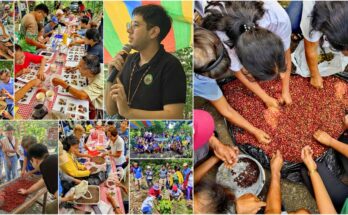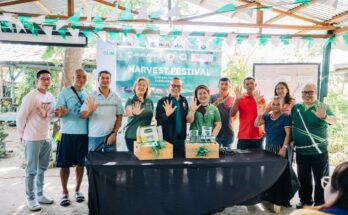The Indigenous People of Nagpana, renowned coffee farmers from Barotac Viejo, are setting their sights on the prestigious Philippine Coffee Quality Competition (PCQC) to elevate both the quality and quantity of their ancestral coffee production. With the support of the Department of Agriculture’s Kabuhayan at Kaunlaran ng Kababayang Katutubo (DA 4K) program, the Nagpana Minority Association (NAMIAS) conducted a two-day training session on August 27-28, 2024, in Sitio Nagpana, Barotac Viejo, aimed at refining their coffee production techniques.
Approximately 30 members of NAMIAS participated in this training, which is a key component of the association’s five-year roadmap to develop a more efficient coffee production system. Their goal is to achieve an annual yield of 120 kilograms by 2025 and to compete in the PCQC, an annual event hosted by the Department of Trade and Industry (DTI) that evaluates the quality of Philippine-origin green coffee beans.
Janene Belarmino, Agriculturist II implementing the DA 4K program, highlighted the importance of this initiative, stating, “This is part of our ongoing effort to support the Indigenous Peoples in enhancing their unique ancestral commodity—coffee. We aim to help them establish coffee as the signature product within their ancestral domain.”
The training was led by Mr. Teddy Cañete, a seasoned coffee farmer with over 20 years of experience from Negros Occidental. Cañete, who also has Aeta ancestry, currently heads the Minoyan Murcia Marginal Coffee Growers (M3CG) Inc., an association renowned for producing fine-grade robusta coffee. During the training, he shared both technical knowledge and personal life experiences, providing insights that go beyond standard manuals and textbooks.

The Nagpana community manages a vast 938-hectare area, with 250 hectares dedicated to coffee farming. In 2023, these farmers produced 7 tons of coffee. Historically, they sold their harvest to Nestlé, but with the intervention of Mr. Jairus Sirue, a DA Western Visayas coffee expert and agriculturist, the farmers have gained a deeper understanding of coffee production, including the ability to identify Grade 1 coffee.
Currently, the association purchases a portion of the harvest from the community to ensure fair income distribution among members. However, due to limited resources, they cannot buy the entire yield, forcing farmers to sell the remainder to external buyers.
The DA 4K program continues to work closely with NAMIAS to further enhance their coffee production capabilities. Future plans include training in post-harvest processes, OPV corn production, value-adding techniques for cassava and sweet potato, and vegetable farming. The association has also proposed an irrigation system project.
Raquel Mateo, President of NAMIAS, expressed her gratitude for the continuous support, saying, “DA 4K ensures that our voices are heard. They trust us and have provided us with numerous projects and training opportunities. We are eager to learn more, especially about other crops like corn, cassava, taro, and sweet potato. We hope to maximize the resources we have here.” (By RAFIS DA6)



